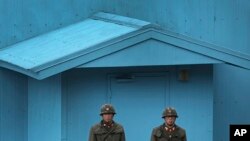Seoul Monday accused the North Korean military of illegally crossing into the South Korean side of the demilitarized zone (DMZ) and intentionally planting landmines that injured two soldiers on August 4th. The U.S.-led U.N. Command that monitors the cease-fire between the Koreas also participated in the investigation of the incident and support’s Seoul’s finding.
Major General Ku Hong-mo with the South Korean Joint Chiefs of Staff condemned the North for what he called a cowardly and despicable act.
“This provocation is a total violation of the Armistice Agreement and non-aggression agreement between South Korea and North Korea,” said Major General Ku.
Last Tuesday explosions from three landmines occurred on the southern side of the DMZ where eight South Korean soldiers were patrolling. One soldier lost both legs in the blasts, while a second lost one leg.
Established at the end of the Korean War in 1953, the DMZ is a four kilometer-wide buffer running the length of the border between the North and South. More than a million mines are believed to be planted along the DMZ, which is considered one of the most heavily militarized borders in the world.
Investigators pointed to the type and design of wooden cases found at the site of the blasts and the explosives used as evidence to support their claim that the landmines were North Korean made. The location of the explosions was in an area that is routinely patrolled by South Korean troops, indicating that that the landmines were recently planted.
South Korea’s Joint Chiefs of Staff issued a statement urging the North to apologize for the attack and vowing retribution.
“As our military has warned many times, we will make North Korea pay an abysmal cost for their provocation,” said Major General Ku Hong-mo.
Yang Wook, a North Korea analyst with the Korea Defense and Security Forum in Seoul says Pyongyang likely acted to intimidate the South and does not believe there will be any significant retaliation.
“So from North Korea’s point of view, they have nothing to lose even if they fail.” Yang Wook said.
Seoul cut most economic aid to the North and imposed sanctions in 2010 after the sinking of a South Korean naval vessel that killed 46 sailors. Seoul blamed Pyongyang for the attack but North Korea has denied any involvement.
This incident will likely draw an angry denial from Pyongyang and increase tensions in the region. Earlier this year Pyongyang objected to the establishment of a U.N. office in Seoul to investigate widespread human rights violations in the North.
North Korea also objects to joint military drills between Seoul and Washington that will begin soon. Last week North Korea offered to suspend its nuclear program if the U.S. canceled the joint drills. Washington has said it will not make a concession to Pyongyang for doing what it is already obligated to do through past nuclear agreements and United Nations restrictions in place.
North Korea analyst Yang Wook expects Seoul to retaliate with more military exercises or increasing the flow in anti-regime information and rhetoric into the North.
“We can pressure North Korea by conducting massive scale military drills or punish them by resuming psychological combat which North Korea fears the most,” said Yang Wook.
Despite some informal discussions, the two sides have also been unable to agree to hold a joint commemoration this week for the 70th anniversary of the liberation of the Korean peninsula from Japanese rule.
VOA Seoul Producer Youmi Kim contributed to this report.





